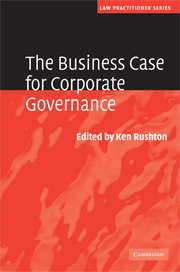Book contents
- Frontmatter
- Contents
- List of contributors
- Acknowledgements
- Introduction
- 1 The role of the board
- 2 The role of the Chairman
- 3 The role of the non-executive director
- 4 The role of the Company Secretary
- 5 The role of the shareholder
- 6 The role of the regulator
- 7 Directors’ duties
- 8 What sanctions are necessary?
- 9 Regulatory trends and their impact on corporate governance
- 10 Corporate governance and performance: the missing links
- 11 Is the UK model working?
- Index
5 - The role of the shareholder
Published online by Cambridge University Press: 23 June 2009
- Frontmatter
- Contents
- List of contributors
- Acknowledgements
- Introduction
- 1 The role of the board
- 2 The role of the Chairman
- 3 The role of the non-executive director
- 4 The role of the Company Secretary
- 5 The role of the shareholder
- 6 The role of the regulator
- 7 Directors’ duties
- 8 What sanctions are necessary?
- 9 Regulatory trends and their impact on corporate governance
- 10 Corporate governance and performance: the missing links
- 11 Is the UK model working?
- Index
Summary
Recent history – growing pressure on shareholders to act responsibly
It is generally recognised nowadays that Britain plays a pioneering role in corporate governance, but this focus and leadership is relatively new. It goes back to the Cadbury Code of 1992, which set out basic principles of board behaviour and how shareholders should respond. Cadbury has now undergone several mutations and evolved into the Combined Code. Through the code system, the UK has developed the famous comply-or-explain concept. This is the key to the UK approach to maintaining high standards of governance. Instead of prescriptive regulation, it relies on consensus around standards, followed by disclosure coupled with peer and shareholder pressure, to drive incremental change in behaviour. In recent years, the focus on the role of shareholders in pushing for high standards has grown significantly.
The UK's lead in governance lies probably in the timing of its corporate scandals. The Cadbury Code was a response to the Maxwell and Polly Peck scandals of that period. The code system, introduced by the UK as a result, helped protect UK companies and their shareholders from the impact of subsequent excess at the height of the stock market bubble at the end of the 1990s. Of course, the market was not entirely free of shock: witness, the crises at Marconi and Cable & Wireless. Still, the UK did at that stage have some considered responses.
- Type
- Chapter
- Information
- The Business Case for Corporate Governance , pp. 81 - 99Publisher: Cambridge University PressPrint publication year: 2008
- 2
- Cited by

